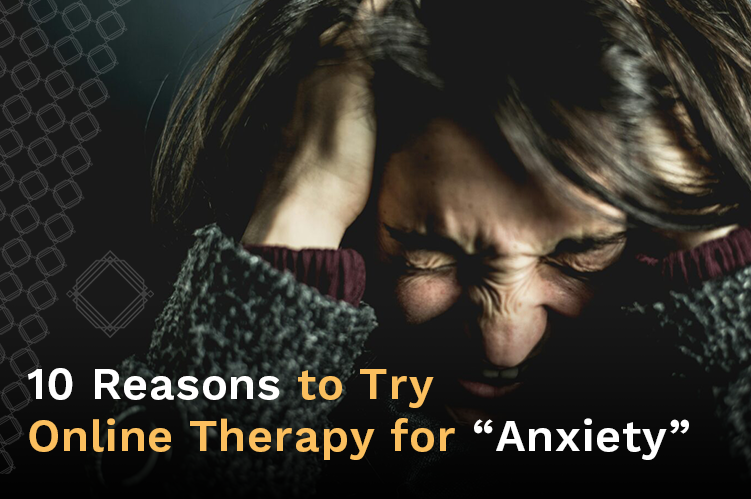

Anxiety is one of the most common mental health conditions, affecting millions of people worldwide. It can range from mild nervousness to debilitating panic attacks, interfering with daily life, work, and relationships. Seeking professional help is a crucial step toward managing anxiety, and with the rise of telehealth services, online therapy for anxiety has become a popular and effective solution.
In this article, we will explore ten compelling reasons why online therapy for anxiety is worth considering, especially for those looking for flexibility, accessibility, and high-quality mental health support.
Convenient Access to Professional Support:
One of the biggest advantages of online therapy for anxiety is its convenience. Traditional therapy often requires scheduling appointments weeks in advance, commuting to a clinic, and sitting in a waiting room. Online therapy eliminates these obstacles, allowing you to access mental health professionals from the comfort of your home.
For individuals with busy schedules, mobility issues, or those living in remote areas, online therapy for anxiety provides an accessible way to receive timely support without disrupting daily life.
Flexibility to Fit Your Lifestyle:
Online therapy offers unmatched flexibility in scheduling. Many platforms provide evening and weekend sessions, accommodating those who work long hours or have family responsibilities.
Additionally, some services offer on-demand chat or video sessions, making it easier to seek support whenever anxiety strikes. This flexibility ensures that mental health care adapts to your lifestyle rather than the other way around.
Comfort and Privacy in Your Own Space:
For many people, seeking therapy can be intimidating. Walking into a clinic, sitting in a waiting room, and facing a therapist in person may create additional anxiety.
With online therapy for anxiety, you can engage in sessions from a familiar and comfortable environment, whether it’s your bedroom, office, or a quiet park. This sense of security can encourage more open discussions and a stronger connection with your therapist.
Privacy is another key benefit. Online therapy eliminates concerns about running into acquaintances at a therapist’s office, allowing for more discreet and confidential treatment.
More Affordable Than Traditional Therapy:
Cost is a significant barrier to mental health care, but online therapy for anxiety is often more affordable than in-person sessions. Many platforms offer subscription-based models, making therapy accessible at a lower cost per session.
Additionally, some insurance providers now cover online therapy for anxiety, further reducing out-of-pocket expenses. If affordability has been a concern, online therapy may provide a budget-friendly solution without compromising quality.
A Wider Selection of Therapists and Specialties:
Traditional therapy is often limited to local providers, which may restrict access to specialists in adult trauma counseling, PTSD, or specific anxiety disorders.
Online therapy expands your options, allowing you to connect with licensed professionals across different regions. This means you can find a therapist who aligns with your needs, preferences, and therapeutic approach. Whether you need cognitive behavioral therapy (CBT), trauma-informed care, or exposure therapy, online platforms make it easier to find the right match.
Immediate Help in Times of Crisis:
Anxiety can be unpredictable, and waiting for a scheduled appointment can feel unbearable during a crisis. Many online therapy for anxiety services offer instant messaging, crisis support, or emergency consultations.
While online therapy is not a substitute for emergency medical care in severe cases, it provides quicker access to professional guidance when overwhelming anxiety strikes.
For those undergoing adult trauma counseling, immediate support can be invaluable in managing emotional triggers and distressing episodes.
Effective and Research-Backed Treatment:
Some people worry that online therapy for anxiety may not be as effective as in-person treatment. However, multiple studies have shown that online cognitive behavioral therapy (CBT) and other evidence-based approaches are just as effective as traditional face-to-face therapy.
Some individuals find online therapy more beneficial because they feel more comfortable expressing themselves in a virtual setting. The ability to communicate through chat, video, or phone calls provides different ways to engage in therapy, ensuring that treatment meets each person’s comfort level.
Ideal for Individuals with Social Anxiety:
For individuals struggling with social anxiety, attending in-person therapy can feel overwhelming. The idea of interacting with a therapist face-to-face may create additional stress, making it difficult to focus on healing.
Online therapy for anxiety removes this barrier by offering sessions in a low-pressure environment. Many platforms allow clients to communicate via chat or email if speaking on a video call feels intimidating, providing a gradual way to build confidence in discussing anxiety.
Better Consistency and Long-Term Support:
Consistency is key in managing anxiety, and online therapy makes it easier to stay committed to regular sessions. Without the hassle of commuting or finding time in a packed schedule, clients are more likely to attend sessions consistently.
Long-term therapy can be particularly beneficial for those receiving adult trauma counseling, as healing from past experiences often requires ongoing support. Online platforms ensure continuity of care, allowing individuals to maintain progress without disruptions.
A Stepping Stone to In-Person Therapy:
Some people hesitate to start therapy due to fear or uncertainty. Online therapy for anxiety can serve as a gentle introduction to professional mental health support.
Once individuals gain confidence and experience the benefits of therapy, they may feel more comfortable transitioning to in-person sessions if needed. This gradual approach makes it easier for those new to therapy to take the first step toward better mental health.
Frequently Asked Questions (FAQs):
How effective is online therapy for anxiety?
Online therapy has been proven to be just as effective as in-person therapy for treating anxiety disorders. Many therapists use evidence-based approaches like cognitive behavioral therapy (CBT) to help individuals manage symptoms and develop coping strategies.
Is online therapy covered by insurance?
Many insurance providers now cover online therapy for anxiety, but coverage varies depending on the provider and plan. It’s best to check with your insurance company to determine what services are included.
How do I know if online therapy is right for me?
If you value convenience, privacy, and flexibility, online therapy for anxiety may be a great fit. However, individuals with severe mental health conditions requiring in-person intervention should consult a healthcare provider for the best treatment options.
Can online therapists prescribe medication for anxiety?
Some licensed providers offering online therapy for anxiety can prescribe medication, but it depends on the platform and the therapist’s qualifications. If medication management is needed, it’s important to seek an online psychiatrist or psychiatric nurse practitioner.
How do I find a reputable online therapist?
Look for licensed professionals on trusted platforms, read reviews, and check credentials. Many services provide detailed therapist profiles to help you find the right fit.
Final Thoughts: Taking the First Step Towards Healing:
Anxiety can feel overwhelming, but help is available. Online therapy for anxiety offers a flexible, accessible, and effective way to receive professional support from anywhere. Whether you need immediate guidance, long-term therapy, or specialized adult trauma counseling, virtual therapy provides a valuable resource for managing anxiety and improving mental well-being.
If you’ve hesitated to seek therapy at IGotU Corp, now is the perfect time to explore online options. Take the first step toward healing today—your mental health matters.





